What I Think — Abzu (PS4 version tested)
After the prolonged and acutely painful development woes that befell Thatgamecompany’s Journey, it’s not at all surprising that the game’s art director – Matt Nava – chose to jump ship and start his own Giant Squid company – with initial set up costs provided by London based movie studio Ink Factory, before 505 Games stepped in to offer publishing support on the Santa Monica studio’s first in-house developed title. In this context, and whilst Abzu parlays Matt Nava’s previous industry lineage and development experience with Journey to become a springboard for the ambitious creative director to build “experimental, narrative and meaningful games“, it’s unfortunate that Abzu truncates these expectations by failing to find its own identity, instead opting to double down on the ex-Thatgamecompany staff’s professional legacy in order to become “Journey underwater“.
That’s not necessarily a bad thing, as those who enjoyed Journey will find much to appreciate in Giant Squid’s deep sea diving effort, as Matt Nava’s previous experience on the sand duned masterpiece certainly pays off. But for anyone else, Abzu‘s rigid adherence to a template that was successfully forged and laid down by Journey, even though it’s iterative in execution, acts to both highlight the game’s innumerable strengths whilst also undermining its core appeal when juxtapositional comparisons are made. And that’s a shame, because in a risk-averse industry that often times has great difficulty in deviating from highly successful formulae, Abzu‘s formulaic release is an uncommon milestone that should be worthy of much jubilant celebration.
From the off, the first thing that grabs one’s attention is how colourful and utterly captivating the game’s water-based visuals are. With the lush cell-shaded graphics and arresting aqua themed effects abundantly showcasing what Sony’s PS4 is capable of, Abzu serves up a compelling argument as to why powerful hardware is oftentimes a necessary prerequisite in enabling game creators to carve out experiences that match their vision – where they’re not constrained by technological limitations.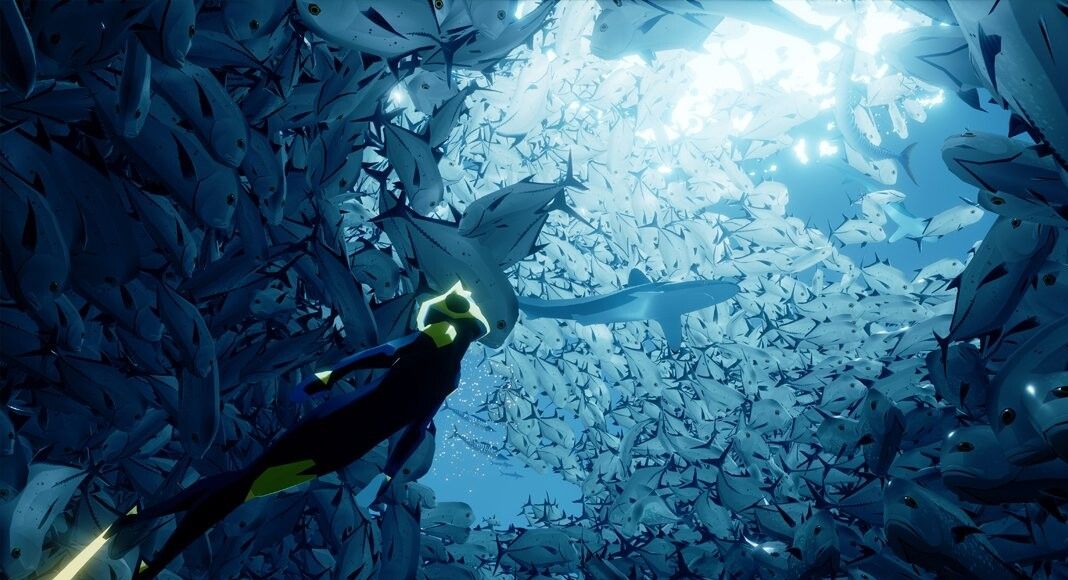 It’s also why Nintendo’s bizarre strategy of working with underpowered hardware seems so counterproductive, as the company is clearly undermining its employees’ ability to maximise their innate potential whilst simultaneously hindering their ability in engineering captivating experiences that are consistent with industry and consumer expectations. As an example, and despite what over-zealous Nintendo fans would have you believe, The Legend of Zelda: Breath of the Wild is a clearly demonstrable example of EAD’s failure to produce games that are consistent with industry-wide graphical and design standards – thus enabling other software developers to steal the march on Nintendo (via games like Skyrim and The Witcher 3) – thus forcing the company into offering up yesterday’s experiences tomorrow.
It’s also why Nintendo’s bizarre strategy of working with underpowered hardware seems so counterproductive, as the company is clearly undermining its employees’ ability to maximise their innate potential whilst simultaneously hindering their ability in engineering captivating experiences that are consistent with industry and consumer expectations. As an example, and despite what over-zealous Nintendo fans would have you believe, The Legend of Zelda: Breath of the Wild is a clearly demonstrable example of EAD’s failure to produce games that are consistent with industry-wide graphical and design standards – thus enabling other software developers to steal the march on Nintendo (via games like Skyrim and The Witcher 3) – thus forcing the company into offering up yesterday’s experiences tomorrow.
The amount of fish shown in any one scene is sometimes breathtaking.
With Abzu‘s initial scene depicting a sunny sky as the camera starts to pan slowly across the clear blue sea, after which it submerges below the watery depths to reveal various underwater life-forms, travelling further and further down into the watery depths of the ocean, before settling upon a mysterious red vortex, we’re granted a brief amount of exposition before the scene suddenly shifts back to the ocean surface to reveal an underwater diver that gains consciousness moments later – with no knowledge of how they got there.
With so little back-story at one’s perusal, the player immediately finds themself in control of the diver, and it’s up to you to figure out as to why you are there as you embark upon your quest. In this context therefore, Journey‘s influence on Abzu is immediately apparent, as both games drop you in the middle of a scenario where the player has to explore their surroundings, but has no clear indication as to why they are there, or what the main objective is.
With one’s curiosity piqued, and after a few moments during which the player can check their bearings and paddle across the sea’s surface, the game prompts you into making a dive. It’s at this point that Austin Wintory’s sumptuous score kicks in, with his elegantly crafted music blending in seamlessly with the beautiful dreamlike visuals. And with the game instilling a childlike sense of exploration, as one surveys the underwater landscape that is teeming with fish, it’s also during this period that one is tasked to acquaint themselves with the game’s controls.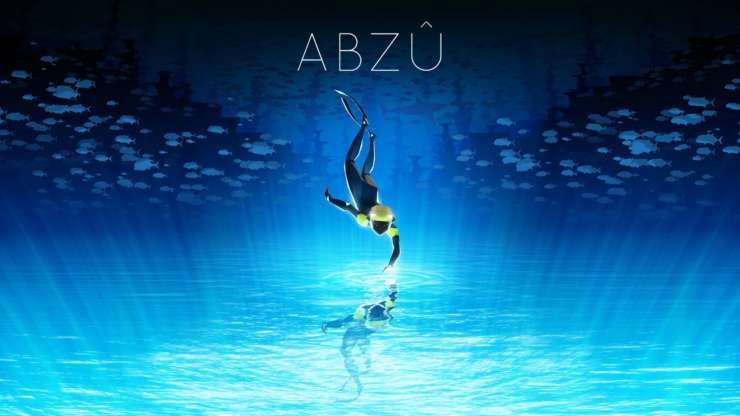
One of the major difficulties that developers face in creating 3D games is making sure that the controls are intuitive enough so as to allow the player to explore their environment whilst the camera is also able to keep track of player movement. And whilst Journey manages to accomplish this feat by enabling the player to traverse their surroundings in a free-form manner, it’s worth bearing in mind that the player’s entire movements are subject to the forces of gravity – where traversal is grounded on a desert plain. In Abzu however, and with the game set underwater, it soon becomes apparent that the extra movement dimension has yielded a scenario where, although the camera and player controls are functional, they’re not entirely perfect. Which is a shame as although Giant Squid should be commended for setting their game underwater, it soon becomes apparent that the reason as to why there are so few games that take a similar approach is because it’s incredibly difficult to have convincing free-form navigation as part of a 3D space where the controls are also in 3D.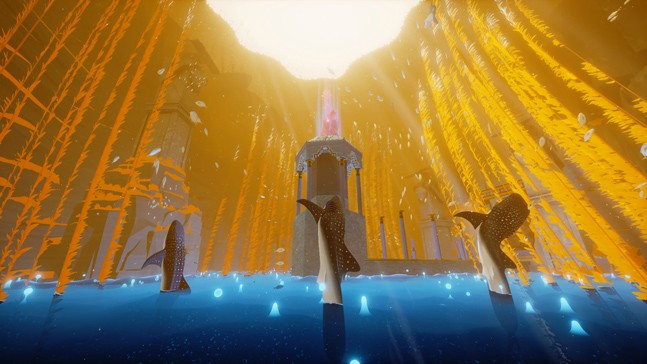 In this context therefore, and even after I had adjusted to the controls, I still felt as if my movement was hindered as a consequence of the camera not being intelligent enough so as to take into account my actions – with the result being that I oftentimes had to wrestle for control of the camera.
In this context therefore, and even after I had adjusted to the controls, I still felt as if my movement was hindered as a consequence of the camera not being intelligent enough so as to take into account my actions – with the result being that I oftentimes had to wrestle for control of the camera.
With the extra dimension yielding some difficulty in movement, one would also expect the controls to also be needlessly difficult. However, nothing could be further from the truth, as whilst navigating the 3D space is sometimes challenging, the controls however are pretty simple for the most part – with tutorial prompts making learning the controls incredibly easy. In fact, one only really needs the twin-sticks as well as about three buttons to get by in the game.
With the cell-shaded graphics instilling a childlike sense of wonder, the game encourages free form exploration – even if its environments are deceptively linear in comparison. And whilst Matt Nava’s desert-filled previous work was an incredibly lonesome experience, Abzu‘s world however is absolutely bursting with life, with certain parts of the game making you wonder as to how the developer was able to get so many fishes within one scene – where each animal is exquisitely detailed and individually animated.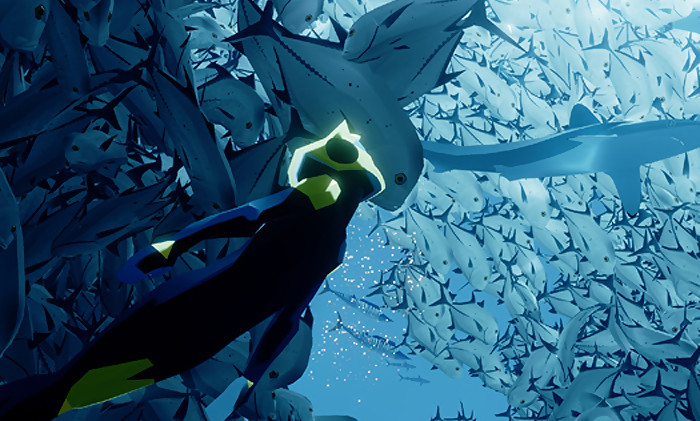 And to be honest, upon witnessing Giant Squid’s efforts, I’m again reminded of how glad I am that the developer had the artistic and commercial sense to release the game on Sony’s powerful PS4 console, as opposed to gimping their vision via having it come out on Nintendo’s underpowered hardware.
And to be honest, upon witnessing Giant Squid’s efforts, I’m again reminded of how glad I am that the developer had the artistic and commercial sense to release the game on Sony’s powerful PS4 console, as opposed to gimping their vision via having it come out on Nintendo’s underpowered hardware.
With beautiful scenery that is often bursting with life, Abzu can’t quite hide the limitations of its environmental designs however.
With the sea offering such a vast and unexplored habitat, Abzu has immense potential in allowing the player to fulfil their underwater scuba diving fantasies. But with the game’s marketing campaign raising such expectations from the outset, it’s somewhat disappointing to discover that the open-world nature of the game’s oceanic environment isn’t explored more fully – with the game-world littered with underwater corridors and arenas that impinge upon one’s freedom via the use of invisible walls. This is a disappointing turn of events as whilst Abzu does offer a world that genuinely intrigues, the real-world implications of not allowing one to fully immerse themself within their environment often leads to the shattering of player illusion.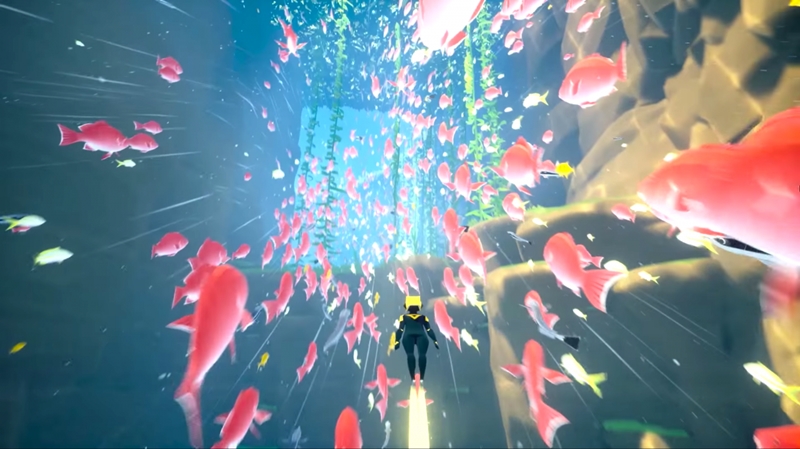 And whilst these shortcuts in designing the game world are understandable because of the studio’s small size, they also prove that Abzu‘s scope is beyond the stretched capabilities of the developer, and that it would have been more appropriate if the game had more resources allocated towards it prior to release.
And whilst these shortcuts in designing the game world are understandable because of the studio’s small size, they also prove that Abzu‘s scope is beyond the stretched capabilities of the developer, and that it would have been more appropriate if the game had more resources allocated towards it prior to release.
The lack of open-space also explains as to why the Abzu is relatively short and can be comfortably completed in under five hours – with some users reporting that they finished it in under two. This is a length that is consistent with Journey, which I also completed in under four hours – yet that didn’t stop the desert-set title from receiving numerous accolades and plaudits from the industry and fans.
As someone who doesn’t believe that a game’s length should be a determining factor as to whether someone should opt to purchase a title – especially in an age where people have insanely large backlogs and are unable to complete the vast majority of their games – I’m glad that Abzu isn’t especially long. This is partly because life is short, and by limiting one’s gaming experiences, one is essentially limiting the richness of their character. But also because Giant Squid finds it difficult to maintain Abzu‘s submersive sense of wonder that it was so easily able to instil early on. This is partially due to the game’s linear environments, where despite the changing of colour palettes that reflected different areas, I found myself getting increasingly bored me as I was forced to traverse endless corridors.
This is partly because life is short, and by limiting one’s gaming experiences, one is essentially limiting the richness of their character. But also because Giant Squid finds it difficult to maintain Abzu‘s submersive sense of wonder that it was so easily able to instil early on. This is partially due to the game’s linear environments, where despite the changing of colour palettes that reflected different areas, I found myself getting increasingly bored me as I was forced to traverse endless corridors.
Of course, in an industry that is symbolised by Call of Duty and its own “corridor based shooter” experiences that are regurgitated wholesale year after year, it does seem churlish to belittle Abzu when so many other games take a successful cookie cutter template and re-release these with a fresh lick of paint each year – with Nintendo being an obvious culprit for making the same game every console cycle. But if one were to refer back to Call of Duty, the reason as to why Activision’s FPS franchise is able to stay fresh and engaging is because it liberally sprinkles its campaigns with story exposition that is often spectacle-laden and dramatic in nature.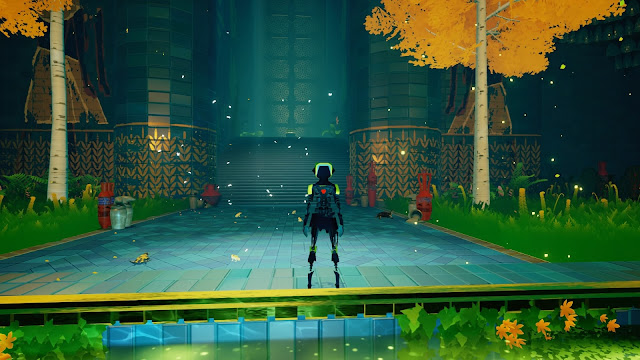 And whilst Abzu does take a similar approach – especially with regards to how it introduces a great white shark that terrifyingly stalks you throughout the game, together with moments that have you swimming with whales as Austin Wintory’s emotionally wrought soundtrack plays in the background – these moments are few and far between and don’t necessarily give too much explanation as to what Abzu is about, with the result being that the game starts to become increasingly repetitive as one is continuously tasked to go down endless underwater corridors and arenas.
And whilst Abzu does take a similar approach – especially with regards to how it introduces a great white shark that terrifyingly stalks you throughout the game, together with moments that have you swimming with whales as Austin Wintory’s emotionally wrought soundtrack plays in the background – these moments are few and far between and don’t necessarily give too much explanation as to what Abzu is about, with the result being that the game starts to become increasingly repetitive as one is continuously tasked to go down endless underwater corridors and arenas.
Luckily, Abzu is able to salvage its inherent monotony by renewing its commitment to story later on in the game. But with the campaign being so short, the entire experience does come across as being quite uneven and disjointed as a result. And to be honest, if it weren’t for Abzu‘s renewed emphasis on narrative later on, Giant Squid’s effort wouldn’t be as memorable as a consequence. That’s not to say that Abzu is a bad game, as there are still plenty of moments that enthral. But even if Giant Squid’s title is meandering and unclear in its focus, it still accomplishes Giant Squid’s objective of creating an experimental, narrative and meaningful game – with the central premise based upon exploring the relationship between man and the aquatic ecosystem.
And to be honest, if it weren’t for Abzu‘s renewed emphasis on narrative later on, Giant Squid’s effort wouldn’t be as memorable as a consequence. That’s not to say that Abzu is a bad game, as there are still plenty of moments that enthral. But even if Giant Squid’s title is meandering and unclear in its focus, it still accomplishes Giant Squid’s objective of creating an experimental, narrative and meaningful game – with the central premise based upon exploring the relationship between man and the aquatic ecosystem.
In closing, it’s unfortunate that Abzu will always come to be defined by Matt Nava’s previous work, as the developer has always traded off his previous association with Thatgamecompany. And whilst Abzu does deliver upon its promise of being “Journey underwater“, it’s also worth noting that there was a reason as to why Thatgamecompany’s title was so short – if only because the developer knew as to how certain experiences could be maximised in their effectiveness if they were deliberately kept short and not needlessly dragged on.
By committing themselves to so slavishly following the template as laid down by Journey, and despite the pedigree, the developers at Giant Squid have ultimately failed to grasp as to what made Journey so special – i.e. it offered a once in a lifetime experience that often robbed the user of its inherent richness via repeated playthroughs. Abzu suffers from this same problem in that I often felt as if I was playing Journey all over again, with the result being that Giant Squid’s game often comes across as being a cynical retread that isn’t as fresh an experience as the developer had hoped. And to be honest, that was always going to be Abzu‘s problem and dilemma – how does a game live up to the impossibly high expectations set by Journey, when it so resolutely follows the same gameplay formula that ultimately prevents it from carving out its own unique identity that doesn’t beholden it to Journey‘s shadow?
Still, Giant Squid Studios must be commended as there is a lot going for their first effort. And with rumours circulating that Abzu might be getting picked up for a physical release at the end of September, I’m certainly looking forward to supporting 505 Games’ publishing endeavour. Because despite the game’s niggling problems that ultimately rob it of true greatness, Abzu is a title that is wholeheartedly worthy of recommendation, and one whose creative ethos I’d like to see more of in the industry.
And with rumours circulating that Abzu might be getting picked up for a physical release at the end of September, I’m certainly looking forward to supporting 505 Games’ publishing endeavour. Because despite the game’s niggling problems that ultimately rob it of true greatness, Abzu is a title that is wholeheartedly worthy of recommendation, and one whose creative ethos I’d like to see more of in the industry.
Abzu was reviewed using PS4 download code as supplied by Giant Squid’s PR.
(Visited 471 times, 1 visits today)
Review: Abzu – PS4
BY JASON FRYE
Jason Frye
Writer and Storywriter
PUBLISHED 6 YEARS AGO
All of Abzu is astoundingly beautiful, but is it a game or more of a guided tour? It has all the normal gamification, including collectibles, but it is not your typical experience. (Your personal perspective will determine if that is a positive or negative. ) After completing Abzu again, I think I might call it a well-crafted experience that gives a certain person exactly what they want. Swim further into this review. The water’s fine.
) After completing Abzu again, I think I might call it a well-crafted experience that gives a certain person exactly what they want. Swim further into this review. The water’s fine.
The first thing anyone will notice is the visuals. This is an absolutely beautiful game, and the art direction is phenomenal. If you have not already, take a look at the trailer. I’ll wait here until you come back…
I told you so. The graphics themselves are not photorealistic, but I defy you not to be enchanted with the game’s world. Every color and image is striking. The game revels in creating an even more amazing vista around the next corner. The lighting is used to incredible effect as you watch the sunlight stream through the openings in the top of the water or watch an underwater light stir envelop in brightness.
Everything procedurally gener- whoops, wrong game.
This is not just an empty world either. It’s full of life. There are sharks, squids, sea turtles, and so many others by themselves or in schools moving throughout the world. The game has special statues setup periodically to allow you to view the game for meditation as you would an aquarium. You can move between the different fish and the camera will follow that fish as it swims in the environment.
The game has special statues setup periodically to allow you to view the game for meditation as you would an aquarium. You can move between the different fish and the camera will follow that fish as it swims in the environment.
Can you find Nemo?
The music is outstanding, and it is a powerful part of every scene. It was composed by Austin Wintory, best known for the soundtrack to Journey. Every area in the game has its own theme, including soft oboes, lonely violins, and triumphant vocal choirs. The mood is carefully set and frames everything you see. There is no dialogue in the game, and the music effectively fills that space.
With few exceptions, the game is mostly a zen simulator. Outside a few areas that funnel the player from one area to another, the majority of the game is filled with the gentle motion of the protagonist swimming to the next cavernous room. The act of swimming is both easy to control and (pun intended) very fluid. Some of the areas are very large and provide you plenty of room to stretch your fins. All spaces have a full x, y, and z-axis movement, and I found swimming around searching for pools to release more fish into the environment, finding shells, and simple puzzle solving was very peaceful and relaxing.
Some of the areas are very large and provide you plenty of room to stretch your fins. All spaces have a full x, y, and z-axis movement, and I found swimming around searching for pools to release more fish into the environment, finding shells, and simple puzzle solving was very peaceful and relaxing.
You’ll have a whale of a time… That was awful. Sorry.
One problem is that you had better like what I just described, because there is really nothing else in the game. It is like going to your grandparents and seeing some object made of glass in a display case. It is beautiful, but there is nothing else you can really do, but look at it. In fairness, there is a slight narrative to be found, but it is vague at its most descriptive and mostly non-existent everywhere else. In watching the credits, some of the musical lyrics were taken from the Enuma Elis, and reading the Wikipedia article was the closest I came to understanding what I was seeing. I am still not honestly sure about the story, and that’s OK. It’s not necessary to enjoy the game. I am also sure someone with a deeper knowledge of symbolism can tell me how dense I am in the comments.
It’s not necessary to enjoy the game. I am also sure someone with a deeper knowledge of symbolism can tell me how dense I am in the comments.
If these fish were piranhas, this’d be a very different game
The other potential problem I found was that it is very short. I did not time it, but it took me around 3 – 4 hours to complete at most, even if I was stopping to smell the underwater roses. Everyone derives and perceives the value of a game differently and subjectively. Subsequent playthroughs do not offer anything new. You can make your own informed decisions about what price is right, Monty Hall.
I have had two big questions while thinking about this review. First, is this a game? Second, is it good? For the first question, I am not sure that it matters. You will need to make your own determination. If you are wondering, I have tried to hold off on a Journey comparison, but I think it is very fair. For people who found Journey to be a sublime, perhaps even a spiritual experience, you should buy this game. For everyone else, especially people who are not sure they will like it, I would wait until the price drops into your value comfort zone.
For everyone else, especially people who are not sure they will like it, I would wait until the price drops into your value comfort zone.
Day 3: They still don’t know I’m not a whale.
For the second question, Abzu does a few things extremely well, and I will not be surprised to see it win best of awards in both art design and musical score. To answer it directly, if you know what you are getting and like it, it is good, and you will see a unique type of game that is not being churned out by the hundreds every year.
Abzu is incredible in its execution, and it is a very tight experience. There is no waste, and it was made with a clear vision of what it wanted to be, although it may be a little thin in content and rely too much on its presentation. Even with the issues I mentioned, I still look forward to diving back into its world when I want something that is as low impact as your grandmother’s water aerobics.
Abzu Review — PS4
-
7.
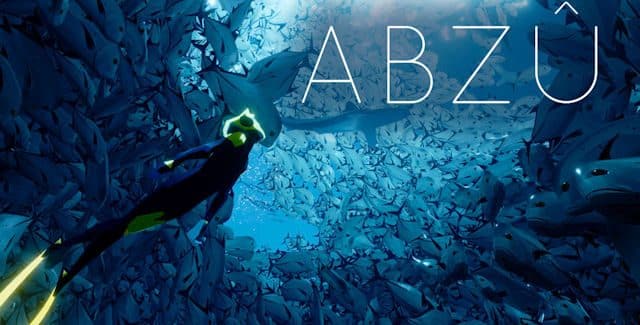 5/10
5/10Overall — Very Good — 7.5/10
Summary
Abzu is a beautiful experience, and the visuals are some of the best I have seen all year. The soundtrack for the game is something that needs to be heard and seen in context to truly be appreciated, but it is good enough to give it a listen separately. The game is relaxing and peaceful to play. If there are others in the room, they will be entranced. Unfortunately, the game is extremely short and does not offer much variety. If this type of game appeals to you, buy it immediately. If not, you may want to wait for a sale. Either way, I look forward to visiting the world again soon.
Sending
User Review
0
(0 votes)
Review Disclaimer: This review was carried out using a PS4 code bought at the expense of the reviewer. This does not affect the content or the final score. For more information, please read our Review Policy.
Petty Developer Photoshops Our Mass Effect Andromeda Article to Bash Star Citizen
READ ARTICLE
0004
Zero North, Zero West
March 1, 2018
Adventure, indie
Innerspace
Adventure, third -party type, fantasy / Middle Ages, post -apocalyptic
COSMOCHORIA 29 September 2014
Arcade, Action, Indie
Hohokum
2014 Q1
Arcade, Adventure, Platformer, Logic
The Pathless
November 12, 2020
Adventure, Third Person, Fantasy / Medieval
Ocean: The place in your heart
December 20, 2021
Adventure, Clicker, Third Person
Figment
September 22, 2017 9003 Adventure Music Game
, Isometric
Loverowind
May 19, 2021
Arcade, Adventure, First Person, Indie, Fantasy / Medieval
Zenko: A Fox’s Tale
August 6, 2021
Free to Play, Arcade, Adventure, Third Person, Fantasy / Medieval, Indie
Weaving Tides
May 27, 2021
Adventure, Puzzle, Platformer, Action, Top-Down, Indie, Isometric, Fantasy / Medieval
Adam’s Venture: Origins
31 March 2016
Adventure, 3rd person, Puzzle
Last Day of June
31 August 2017
Adventure, 3rd person, Futurism (Future)
A Mortician’s Tale
October 18, 2017
Arkada, Indi, Visual Novella, Point & Click
Jotun
29, 2015
ACSHEN, ANDIS, Indi
EVERYTHING April 21, 2017 April 21 , Adventure, Indie, Simulation
Rebel Galaxy
October 20, 2015
Simulation, Action, Adventure, Futuristic (Future)
Abyss
August 23, 2012
Arcade, Side View
Lumo
May 24, 2016
Arcade, puzzle, indie
FLAME in the FLOOD
24 24, 2016
Adventure, isometry, puzzle, indie
minko’s night Market
2023 9000 , Business / Management, Side View
Kona
May 17, 2017
Adventure, First Person View
Have you played ABZU ? Tell us what you think about the game →
PLAY AT HOME GAMES 2021 | FREE GAMES FOR PS4 AND PSVR — LONG LIST — TEA-TV
2021 Feels like a lot of 2020, nali? Contrary to what I see, what they say to my sevide, here, in Great Britain, somehow and in many places around the world, still the imam pat, they promise to normalize everything.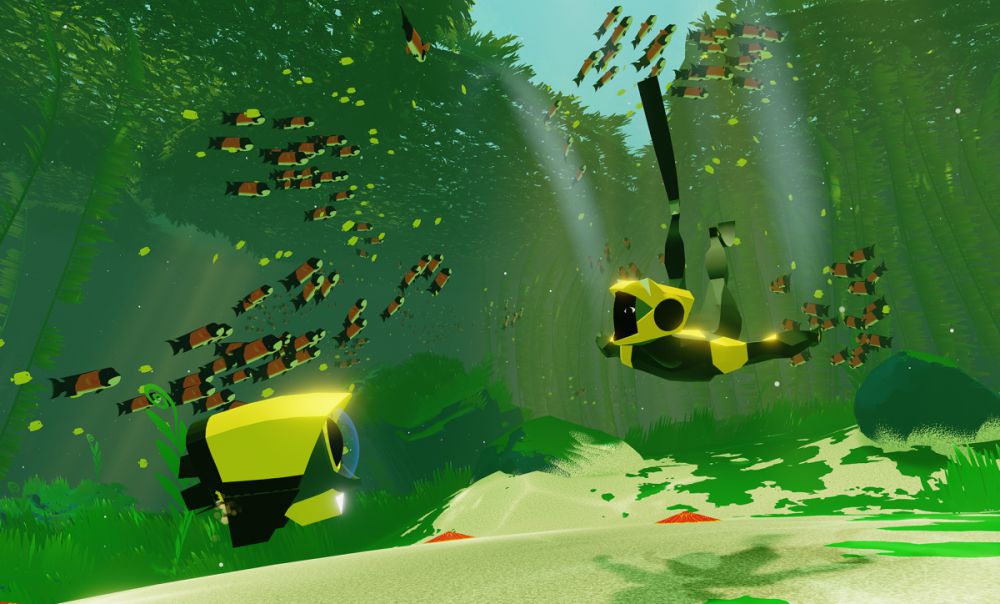
Advertisement
It’s all right, it’s not fun, we can’t go anywhere, PlayStation starter of the Play at Home campaign for 2021. With it, we get a selection from free games, which we can and play, and some interesting titles in the combo and Ima — from golyam to pitya a little better.
So you can see how you are playing at zero price on your PS4 or PS5, with everything we know for adding new games.
-
196 25 Mar .
- ABZZU
- HEALST in GUNEON
- Rez Infinite
- Subnautica
- will witness
Strings of SI SI SIS, Che RATCHET and CLANK all about the disconnection and Play the Brusha Che still have time and go ahead.
PSVR Rejection Free Play at Home games ca:
- Astro Bot Rescue Mission
- mx
- Thumper
- Hartien Zver
How are the games coming up and playing at home in 2021?
Contrary to the list of gornias, it’s kind and never yama, let’s put our nose on something for free, nay-golyamata and nay-kindness, the game is coming.

